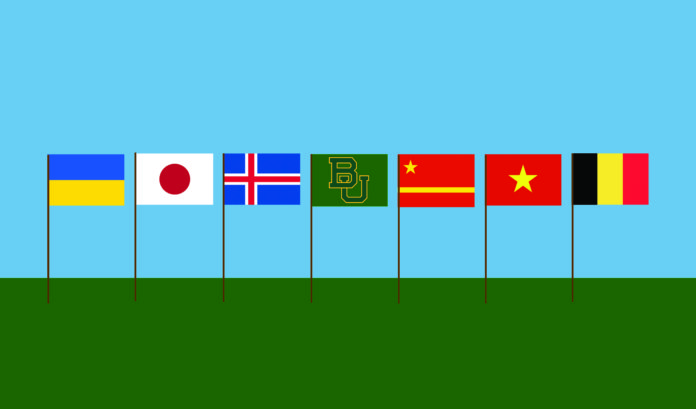by Kaylee Greenlee | Reporter
Over the weekend, Baylor hosted the Texas Collegiate Model United Nations conference put on by the Osgood Center. Over the last 11 years, the Osgood Center has trained students from around the world in Model United Nations and Model Asia Pacific Economic Cooperation.
The Osgood Center sponsors Model United Nations programs of various kinds in Washington, D.C., Texas and China while striving to provide students experiential learning opportunities.
“Just think, most of your academic preparation as an undergraduate student is in the classroom; it’s just you and the material. In your work life, it’s all about interacting with others and trying to make decisions. Model UN trains you how to do that,” Dr. Shelton Williams, former professor of political science and international studies at Austin College in Sherman, said.
Williams founded the Osgood Center in 2006 after moving back to Washington, D.C. He was the faculty adviser for the Model UN program at Austin College and also ran the Washington, D.C., internship program, the leadership program and taught international politics.
The conference was held from Feb. 2 to 4, and University of Texas at Austin, University of Texas at Dallas and several Texas A & M campuses were also in attendance. It was composed of a General Assembly First Committee, which deals with disarmament and economic issues; the United Nations Educational, Scientific and Cultural Organizations (UNESCO), which represent cultural heritage and education; Asia-Pacific Economic Cooperation (APEC); and the Security Council which oversees international security issues.
Before the conference, students are assigned to represent a UN member state and therefore take on the persona of that member state. In order to accurately present the nations positions, they are required to research the pre-assigned issues from the perspective of those nations to figure out what position the nation would take.
Student teams research and prepare position papers which consist of a short statement of their nation’s position and priorities during the conference. Topics are set by the conference committee, in advance so that the position papers can be presented to the body of nations.
Dr. Rebecca Flavin is a senior lecturer in the department of political science in the College of Arts and Sciences. She is the faculty adviser for Baylor Model United Nations.
“The UN operates on consensus basis or strives for consensus, so [the students] want to formulate solutions that are going to generate as much support as possible,” Flavin said.
There are two main parts of the conference, a formal session and an unmoderated caucus. The formal session is generally held in a board room setting where students follow Robert’s Rules of Order, a guide for conducting meetings and making decisions as a group, which dictate the conduct of the meeting. The latter consists of splitting into committees where they try to build broad support and consensus around a resolution.
“Model United Nations is really a wonderful opportunity for students to think about both approaching things from the perspective of a particular member state and how to strive for consensus through seeking common ground with other nations that may have a dramatically different perspective,” Flavin said.
Students on Baylor’s team represented the countries of China, Vietnam, Japan, Belgium, Iceland and the Ukraine. They won numerous awards at the conference, including first and second place position papers for China and Japan, respectively. The Ukraine, Japan and China took first, second and third respectively in Security Council. Japan and Vietnam took first and second in APEC. Japan and Vietnam also took first and third in General Assembly First.
The team also received several best delegate awards. China and Japan both received the outstanding delegate award, the highest delegation award, for their representation in all committees. Ukraine and Vietnam both received distinguished delegation awards. China received the best delegate award for APEC; China and Ukraine tied for the Security Council; Japan and the United Kingdom, represented by the University of Texas in Dallas, tied for the UNESCO delegate.






